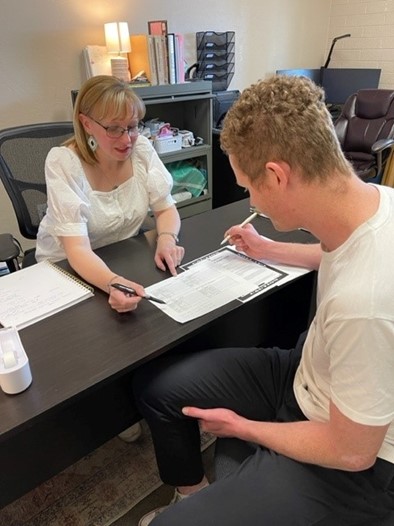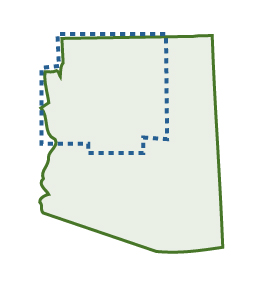
By Elliott Bochstein, RCAC Staff Writer
Nearly half a century ago, the phrase “poverty with a view” was coined to poke fun at the exorbitant cost of living in Flagstaff, Arizona. Today, it serves as a bleak reminder of a worsening crisis that threatens to uproot the region’s most vulnerable communities.
A journey through Northern Arizona can reveal some of the nation’s most awe-inspiring landscapes: Sedona’s fiery red rocks, the Grand Canyon’s imposing chasms and the world’s most extensive ponderosa pine forest. However, these breathtaking vistas offer little comfort to local communities grappling with a growing affordable housing crisis that threatens to plunge them into a relentless cycle of poverty.
Flagstaff reflects the rest of the country’s growing disparity between opulence and extreme poverty. Within steps of multimillion-dollar homes and fancy bed-and-breakfasts, one finds overcrowded apartment complexes, unsanctioned RV camps and a growing population of unsheltered individuals and families. While an estimated 17.4 percent of the population lives in poverty, the city also boasts nearly 4,000 second homes that make up a fifth of all city parcels. Short-term vacation rental platforms like Airbnb and Vrbo have further aggravated the city’s dire housing shortage, with AirDNA reporting over 2,000 listings in or near Flagstaff alone.
Over the past decade, median home prices in Flagstaff have more than doubled and rent has surged by 66 percent while average worker income has only increased by 37 percent. Meanwhile, 65 percent of households are classified as low- to moderate-income earners, with 45 percent considered housing cost-burdened, which means they have to allocate over 30 percent of their monthly income to their housing expenses.
The widening gulf between income and housing costs poses a huge challenge for essential workers, teachers, municipal staff and employees across various sectors. For many, it’s created a precarious situation where common setbacks such as job loss or an unexpected expense could be enough to push them over the edge. This issue has also become a fundamental economic development problem for the entire region, as local employers face an uphill battle to retain their workforce.

Addressing the crisis through collaboration and client-centered solutions
“Affordable housing used to be the problem of folks who are low-income, on a fixed income or otherwise on the margins,” explained Devonna McLaughlin, Chief Executive Officer of Housing Solutions of Northern Arizona (HSNA). “Now we have trouble recruiting doctors for the hospital or city managers.”
HSNA is a nonprofit organization dedicated to providing access to affordable, safe and decent housing for residents of Coconino, Yavapai and Mohave Counties. For over three decades, HSNA has offered a broad range of services in an area that now spans over 40,000 square miles. These services include transitional housing for domestic violence survivors, financial literacy and credit counseling, scattered-site affordable rental units, motel conversions for transitional housing, and pre-purchase housing counseling and financial assistance for first-time homebuyers.
As a Rural Community Assistance Corporation (RCAC) subgrantee, HSNA receives support through the Wells Fargo Keeping People Housed initiative. Wells Fargo has funded HSNA for several years and contributed over $38,000 to HSNA in Fiscal Year 2023.
“Partnering with RCAC and Wells Fargo has had a significant impact on our capacity to build outreach and enhance client services, allowing us to better support low- and moderate-income households in Northern Arizona,” McLaughlin said. “Each program is designed to be client centered. We believe and operationalize that our clients are integral in determining and meeting their housing needs.”
HSNA’s partnership with RCAC and Wells Fargo has enabled the organization to expand housing counseling services in Yavapai County, appoint a second full-time housing counselor, and continue to assist residents in accessing resources for housing stabilization. In addition, HSNA provides support for low-income renters and homeowners to access financial assistance through state-run online portals and collaborates with local organizations to help homeless households find and secure housing.
Despite the staggering scale of Northern Arizona’s housing crisis, HSNA is striving to address the urgent need for affordable and safe housing. The organization has dramatically impacted clients’ lives by helping them navigate a complex housing landscape and even saving individuals from the devastating consequences of homelessness. Let’s examine the tangible impact HSNA has made in its clients’ lives.
Pamela: Overcoming Financial Obstacles
Pamela, a single mother to her teenage daughter Monica, found herself facing the need for home repairs and increasing financial pressures. In search of help, she reached out to HSNA. Together with her housing counselor, they identified the Homeowner Assistance Fund (HAF) program as a key first step to stabilize her housing situation. The HAF program, administered by the Arizona Department of Housing, required navigating an online application portal and a complex approval process.
HSNA’s housing counselor provided Pamela guidance throughout the application, assisting with necessary paperwork and communicating with HAF administrators. The counselor also contacted the Homeowners Association (HOA) to obtain past-due balance statements for submission to the program. After just over a month, the Arizona Department of Housing informed HSNA that Pamela’s past-due HOA balance would be cleared, along with three additional months of HOA payments. With the support of HSNA, Pamela avoided foreclosure, securing stable housing and the ability to continue making HOA and mortgage payments.
Diana: Navigating a New Beginning
After Diana and her young child escaped homelessness and found shelter in one of HSNA’s permanent rental units, it appeared to be a fresh start. However, when her son fell ill, Diana found it difficult to juggle work and her caregiving responsibilities, leading to unpaid rent and fears of eviction. As a new tenant, Diana had been provided with resources for rental and utility assistance during her lease signing, which led her to reach out to her HSNA housing counselor for support.
The counselor worked diligently to help Diana navigate the Emergency Rental Assistance Program (ERAP), administered by the Arizona Department of Economic Security. Through ERAP, Diana’s past-due rent was brought current, and she received assistance for an additional three months. Later, in January, the counselor worked with Diana to renew her ERAP application, securing even more support. With HSNA’s guidance, Diana was able to maintain permanent housing for herself and her son, ensuring a brighter future for their family.
Jesse: From Homelessness to Hope
Jesse had endured the harsh reality of homelessness for years before finally finding a place to call home. However, when life took an unexpected turn and he lost his job, Jesse struggled to maintain his housing, falling behind on rent payments for five months. Without internet access and thousands of miles away from his family in New York, his options were limited.
In a fortunate turn of events, Jesse’s Catholic Charities Housing Case Manager contacted HSNA, who promptly provided resources and guidance as he submitted his ERAP application. On Feb. 13, 2023, Jesse’s application was approved, and his rent was brought current. Thanks to HSNA, Jesse averted a return to the cycle of homelessness, showcasing the transformative power of community resources and a human connection in overcoming life’s obstacles.
Northern Arizona’s affordable housing crisis requires concerted efforts from a range of stakeholders to ensure that “poverty with a view” becomes an unpleasant memory, not an inescapable future. To meet that goal, the Wells Fargo Keeping People Housed initiative, working with RCAC, is committed to ensuring that HSNA has the necessary resources to implement client-centered solutions for the communities it serves.
In the face of enormous challenges, the partnership between Wells Fargo, RCAC and HSNA will continue to have a transformative impact on the lives of individuals and families struggling to overcome housing insecurity.
